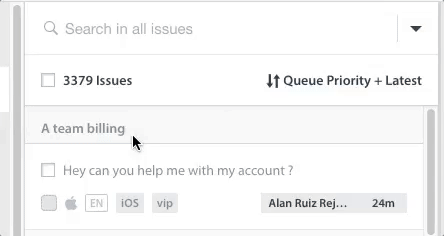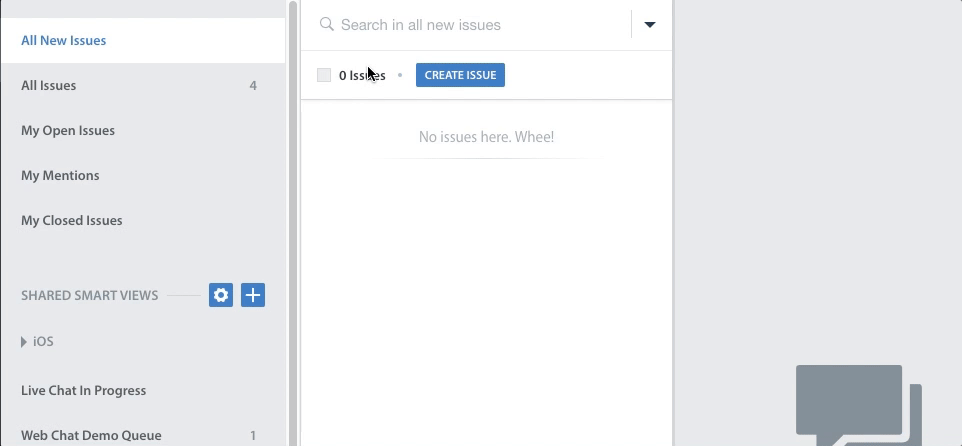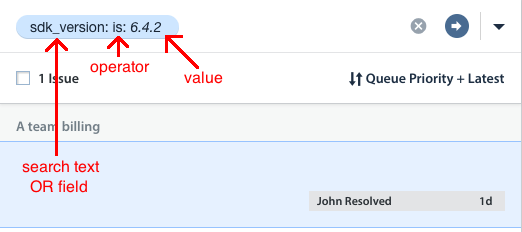Advanced Search allows you to find Issues based on various data points available in your Dashboard. You can define an Advanced Search formula, aka a statement, that mimics a sentence structure. These searches allow you to filter Issues based on Device Information, User Information, Private Notes, Agent Assignee, text within the Issue, attachments, intents, and more.
Advanced Search filters consist of the following:
- Fields: parameters you want to search by. Examples include app_name, platform, assignee, issue_status, and more. A full list of options can be found by clicking the question mark icon available below the drop-down on the right side of the search bar.
- Values: these are dates, numbers, text, tags, intents, and other items that complete your Advanced Search Statement. When building an Advanced Search Statement, the Operator you use will determine whether the Values can be pre-populated or require manual input for the desired Values.
- Operators: provide options to ‘include’, ‘not include’, or ‘match’ a Field to a certain Value. Operators can also include statements such as ‘is’, ‘is not’, ‘is before’, ‘has’, ‘greater than’, and much more. The Operator options available to you will change based on the selected Field.
- Boolean Operators: allow you to further segment your search query by filtering to include or exclude specific Values. A guide to Boolean Operators and some examples are provided towards the end of this article.
| Boolean Operator | What it does |
|---|---|
| AND | Include A and B |
| OR | Include A or B |
| NOT | Don’t include A |
Example 1: Identify Fraud in-app users for reporting
Show me Issues submitted for January 2018 from iOS or Android that have been marked as Fraud through either a Tag, Custom Issue Field, or a Private Note left by an Agent. This search is useful for Admins to account for all Fraud cases and follow up as needed.
Statement: creation_date: is_between: 2018-01-01, 2018-01-31 AND (platform: is: ios OR platform: is: android) AND (custom_issue_fields: has: fraud OR note: contains: “fraud”)
Example 2: Review the volume of Issues from German speaking users
Show me New Issues from German speaking users in Europe in the European language Queue that are assigned to my German Agent (Hans). This helps you review the volume of this specific Issue type at any given point in time.
Statement: (status: is: new OR status: is: new_for_agent) AND queue: is: German AND country_code: is: de AND language: is: german AND assignee: is: hans@helpshift.com
Example 3: Look up paid players to offer support with billing issues
Show me all paid and new Players on all iOS or Android devices that are below 9.3.5 who are still waiting for a response by an Agent. You can use this search to identify Issues from paid users who have reported a billing issue to quickly follow up with a solution.
Statement: custom_issue_field: Paid? Is_true AND custom_issue_field: Sign Up Date: is_after: 2018-01-01 AND platform: is_one_of: Android OR platform: is_one_of iOS AND os_version: is_not: 9.3.5 AND status: is: waiting_for_agent
Example 4: Give all issues with ‘specific intent’
Show me all the new issues where user Intent was selected or identified as Forgot Password, This helps to review the volume new issues with the intent type forgot_password.
Statement - Status: is: new OR status: is: new_for_agent AND Intent: is: forgot_password
To learn about how to use Advanced Search to look up Issues by select Real-Time Operations metrics, please see How do I search for Issues by interaction time or by how long they were in a backlog?
To learn how to saved Advanced Searches for use in your daily workflow, see How do I use the Saved Search feature?






